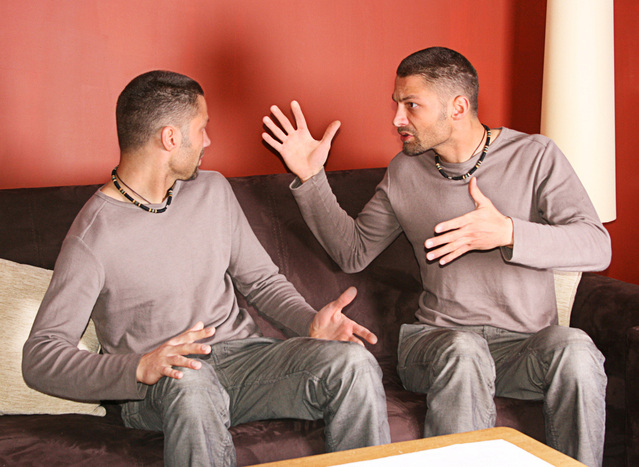Jesus Never Lost His Composure

If we analyze the life of Jesus Christ, the one thing which is most evident out of all of His characteristics is that He never lost His composure. No matter what situation or circumstance He encountered, He was always untroubled and composed. Even when the religious leaders threatened His life, He was able to either walk right through their midst or slip away unnoticed.
Jesus was tempted (tested) by the devil in the wilderness, but He never rose up in anger or commanded him to flee. He merely responded to each attempt with a passage in context from God’s word. He knew just what to say at any given moment.
A storm arose while He and His disciples were at sea, yet Jesus never grew anxious or panicked. There was absolutely no fear in Him. In fact, during the peak of the storm, “…He was asleep” (Matthew 8:24). He had such peace in the situation that He had no need to be awake.
Then “…when He was come to the other side into the country of the Gergesenes, there met Him two possessed with devils, coming out of the tombs, exceeding fierce, so that no man might pass by that way” (Matthew 8:28). But He was not fazed by them at all. Instead, He cast the devils out into a nearby herd of swine, maintaining full control of the situation.
Later Jesus healed a man with a withered up hand. The religious leaders became angry because He did it on the Sabbath. They took God’s commandment given over a thousand years earlier—to honor the Sabbath, keep it holy, and do no work on that day—to such an extreme that even healing was not permitted. Yet in their ‘holy’ zeal, they were hypocrites, because they permitted livestock to be rescued out of a pit on the Sabbath without penalty. As a result of Jesus’ actions, “… the Pharisees went out, and held a council against Him, how they might destroy Him” (Matthew 12:14). But this did not bother Him. “…when Jesus knew it, He withdrew Himself from thence: and great multitudes followed Him, and He healed them all” (v. 15).
Once Jesus and His disciples were in a desert area ministering to the people. The day grew late and no food was available anywhere nearby. He did not worry, but He could have let Himself become overly concerned and begun to make arrangements for getting food. On the contrary, He took a handful of bread and fish, blessed it, and gave it to His disciples to distribute.
He was fully confident that the thousands present would have enough to be satisfied, with plenty left over.
Even though Jesus always kept His composure, He was not a soft-spoken, passive, non-confrontational person. Once “…Jesus went into the temple of God, and cast out all them that sold and bought in the temple, and overthrew the tables of the moneychangers, and the seats of them that sold doves, and said unto them, It is written, My house shall be called the house of prayer; but ye have made it a den of thieves” (Matthew 21:12, 13). Yet He still maintained control of Himself and the situation. After all, this was His house and their ungodly actions were desecrating it. Afterward, “…the blind and the lame came to Him in the temple; and He healed them” (Matthew 21:14). He never demonstrated any bitterness or hatred. His anger was a righteous anger and nothing greater.
More than once the religious leaders tried to trap Him. One case involved paying tribute (taxes). They asked Jesus, “Tell us therefore, What thinkest thou? Is it lawful to give tribute unto Caesar, or not?” (Matthew 22:17). And once again, Jesus did not lose His composure. “…Jesus perceived their wickedness, and said, Why tempt ye Me, ye hypocrites? Shew Me the tribute money. And they brought unto Him a penny. And He saith unto them, Whose is this image and superscription? They say unto Him, Caesar’s. Then saith He unto them, Render therefore unto Caesar the things which are Caesar’s; and unto God the things that are God’s” (Matthew 22:18-21). He effectually shut them up and exposed their foolishness with little more than raising His voice.
At one point, the religious leaders grew so disgusted and upset with Jesus and the truth He proclaimed that they tried to kill Him on the spot. “…they took up stones to cast at Him: but Jesus hid Himself, and went out of the temple, going through the midst of them, and so passed by” (John 8:59). He still did not lose His composure and let Himself get out of control.
Even when Jesus was tried and put on a cross for crimes not committed, He never angrily defended Himself. He did not try to fight physically for His innocence. While He hung on the cross in extreme pain, He cried out, “…Father, forgive them; for they know not what they do…” (Luke 23:34). He could have called out to His Father to send destruction upon the guilty and to get Him off of the cross.
So how did He manage to do all this without ever yielding to the devil, or just giving up? It was all due to His relationship with His Heavenly Father. He declared, “I and my Father are one” (John 10:30). Jesus continually sought and communicated with Him, never allowing their fellowship to become strained or broken. Whenever He had the opportunity, Jesus would go before His Father in prayer, sometimes all night long.
Through this unity, Jesus knew just what to say and where to go at any given moment. He never worried or doubted. He had no concern about others taking His life.
“Then they sought to take Him: but no man laid hands on Him, because His hour was not yet come” (John 7:30 emphasis added). Jesus had to fulfill all of His Father’s requirements first. He was subject to His Father’s will and none other. His Father knew what was best for Him, and anyone else who would believe in Him.
Therefore, if Jesus, the very Son of God, had to continually go before His Father in prayer as a human being, how much more so should we, as children of God, do the same? God provided His Son in the flesh for us as our perfect example. He wants us to follow His Son’s example and be in close fellowship with Him. When we grow fearful and doubt Him, we have slipped out of that fellowship. We will always lose control of a situation when our relationship with Him is strained or broken. The only way that we can have a close bond with our Heavenly Father and maintain a level of calmness in any situation is to do like His Son and spend quality time in prayer and communication with Him. We need to continually place His interests for us above our own. Jesus never lost His composure, and neither should we.
[Additional image credits: Opening photo from marcello99 at Freeimages.com]




